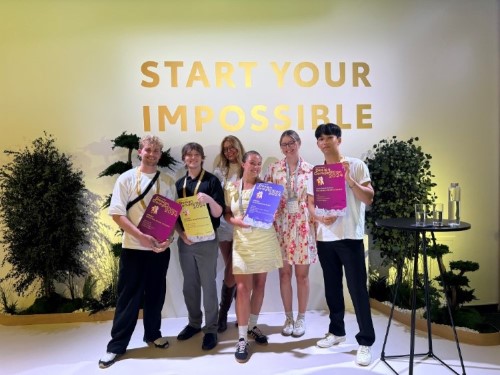Gold, silver, bronze: only top winners in the Toyota Logistic Design Competition 2024 in Paris
About Toyota Logistic Design Competition
Held biannually, the Toyota Logistic Design Competition celebrates 10 years since its first edition. Students are challenged to think up innovative, no-copy-paste, out-of-the-box ideas to provide sustainable solutions for different problems in logistics.
The idea behind this year’s theme Every little bit counts is that the death of one thing gives life to another. Since our planet only has one life, the challenge this time around was promoting circular economy through logistics. Possibly one of the bigger challenges ever set in this competition. Which means submissions had to transcend traditional design with a widened scope.
Monica Perez Lobo, VP Sustainability Toyota Motor Europe, was extremely positive: “Design is the first step towards sustainability: how materials are used, how vehicles can be dismantled and recycled in the future. I can see the students really have this mindset in terms of how to contribute to the planet and society with their designs, which is great.”
Nearly 1000 designers from over 50 countries showed their interest in the competition. 160 submitted their creative concept, many of which of outstanding quality. In 2 jury rounds, 10 finalists were selected and presented at Milan Design Week back in April.
New this year, there are only top prize winners in three categories, in the areas of transportation & product design, user interface, and business innovation design. Each category winner receives 5,500 Euro.

Toyota Logistic Design Competition Category Industrial & Automotive Design
Nicolà Borrer from Royal College of Art, London, UK, with Micro Cab
About MICRO CAB
In a nutshell, Toyota Micro Cab envisions a circular and self-sufficient autonomous mobility service for inclusive, sustainable cities in the future. Solar-powered micro cabs transport people or cargo over short commutes in urban areas. A highly efficient parking method saves valuable city space and allows for energy balancing between the cabs. Each city will have their unique cabs, which are integrated in the local public transport network for a circular parts and material economy. The concept thrives as a network, with cabs communicating to efficiently meet all mobility needs. Using swarm intelligence, they distribute energy amongst the fleet and strategically park to optimise operations.
Toyota Logistic Design Competition Category UI, UX & Service
Maren Javenes (UX designer) / Elise M.L. Almaas (Service designer) / Anne Selseng (UX designer) from the Norwegian University of Science and Technology, Trondheim, Norway with Enviru
About ENVIRU
“Meet our game-changing robot, redefining litter collection,” that is how Maren, Elise and Anne introduce their awarded design. Recognising challenges around littering, the student group developed a rewards app with gamification. Users capture trash photos, earning redeemable points for store discounts. A long-term value concern arose in that the app did not remove the barrier associated with litter picking. Discussing transport challenges and litter management led to a garbage robot constituting effective solutions.
Elise: “We wanted to take the shame away from picking up litter and reward people for wanting to do the right thing. The UX system complements the robot.”
Toyota Logistic Design Competition Category Business Innovation Design
Simon Lavender, from California State University, Long Beach, USA with Bloom Charge
About BLOOM CHARGE
As the designer describes the concept, Bloom Charge is about creating the fresh air that fuels our future. The number of people living in cities will only increase. Denser urban infrastructure traps heat and raises air pollution levels. Bloom is effectively a circular fuelling system with tree-like fuelling stations based on biotechnology that cool and clean urban air with algae. A grove of Bloom canopies offers endless opportunities to a multifuel society, in logistics and beyond.
Toyota Logistic Design Competition Category Ian Cartabiano Award
Juyeong Son, from Coventry University, Coventry, UK with Flex
The work of Juyeong Son, Flex, earned the prestigious Ian Cartabiano Award, a special award overarching all categories, decided upon by the VP Advanced Design for Lexus & Toyota at Calty Design Research. Ian evaluated the works across the board to determine which project paid the most attention to design. The sheer scale of task did not make it an easy pick, given the outstanding quality of many of the entries.
About FLEX
Flex is an all-in-one mobility sharing platform answering to urban congestion and urban delivery issues. Dynamic, bike-size delivery vehicles have a 360° driving experience and make use of gimbal technology, which permits a body or parcel to incline freely in any direction or suspends it so that it will remain level when its support is tipped. The stabalising effect prevents damage of the storage compartment's contents like food or small, fragile products.
Lieselotte Everaerts
Toyota Material Handling Europe
lieselotte.everaerts@toyota-industries.eu
Tel: +32 3 302 3245
M: +32 498 69 73 92
